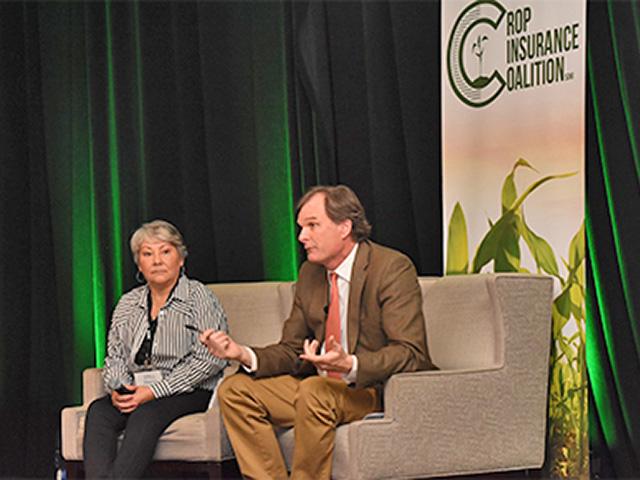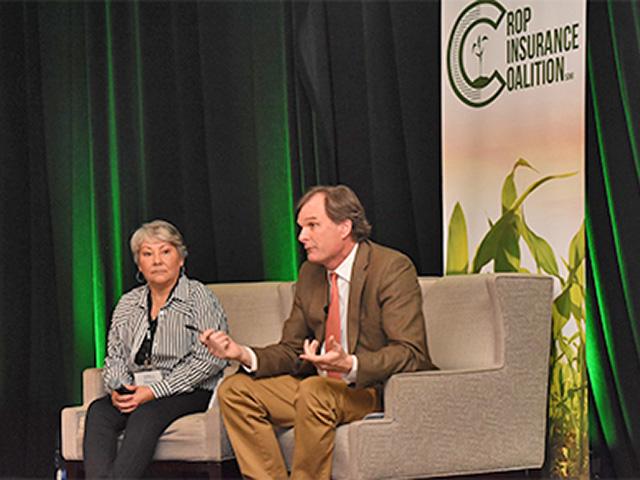Ag Policy Blog
USDA Officials Urge Crop Insurers to Support Broader Access
SCOTTSDALE, Ariz.,(DTN) -- Agriculture Undersecretary for Food Production and Conservation Robert Bonnie and Risk Management Agency Administrator Marcia Bunger on Friday told the nation's crop insurance industry representatives that expansion of insurance to more crops and livestock and underserved farmers will increase support for the program in Congress and among the public.
In a speech to the Crop Insurance and Reinsurance Bureau annual meeting here, Bonnie, whose position requires Senate confirmation, said it is important "to make sure in crop insurance we are serving all of agriculture" -- small and big farmers and historically underserved producers.
Crop insurers have traditionally focused on big acreage crops such as corn and soybeans, but Bonnie said it's important to write policies for livestock producers, fruit and vegetable and other specialty crop farmers and Tribal and urban farmers.
When thinking about budgets, "serving all of agriculture is the smart thing to do, get more people inside the tent. It is in all of our self interest," he said.
That includes, Bonnie said, hiring more diverse crop insurance agents to sell policies to minority farmers.
"We have to stretch ourselves," Bonnie said, adding that Democrats in Congress are particularly interested in policies for urban farmers.
It's important to maintain support for crop insurance because it helps create "a stable agricultural system" that supports rural communities, Bonnie said.
In a short interview, Bonnie said he has not gotten push-back from the industry about expansion of the program into nontraditional lines of insurance, but acknowledged that policies for smaller acreages are harder to write because it is harder to spread the risk.
Asked if the expansion is a problem for the reinsurance industry, which buys parts of policies to spread the risk, James Long of Renaissance Re Risk Sciences said it is not because the newer policies will make up only a small amount of the business of the major insurance companies.
P[L1] D[0x0] M[300x250] OOP[F] ADUNIT[] T[]
Bunger, a political appointee who runs the crop insurance program under Bonnie, said that she had lived her entire life in South Dakota and knew only corn and beans before becoming head of RMA.
Now, she said, she understands other crops and that diversity is not just about people but other crops as well.
"We need to think about how we are going to snare our part of that tax dollar," she said.
Crop insurance "is no longer a rural concept. It embraces and should embrace even more the small farms, the gardens in New York City. Recognize that support you are going to need on the Hill," she said.
"We need crop insurance from a food and national security perspective," Bunger said. "If everyone has access to crop insurance with agents motivated to sell to them, you will not only see what we have today but a much more expanded support of what crop insurance can be."
Told by an attendee that managing the expansion of livestock insurance has been difficult, Bunger said that there is a risk management fund in which companies can participate.
Developing the livestock program requires "a balance" between managing risk and keeping the policies affordable. she said, adding that maybe a higher level of subsidization is needed.
Bunger said that after attending an international crop insurance conference in Spain, she can now say, "we have the best crop insurance program in the world."
Leaders in other countries are coming to USDA for advice on setting up crop insurance programs, she added.
Bunger praised now-retired and current RMA civil servants for doing the technical work that keeps the program working, but added, "We don't get to rest on those laurels -- don't be led into a false sense of security."
Bunger said she never asks farmers what they think about climate change, but rather whether the weather has changed over the past decade. They react by asking her if she is "an idiot," and say that, of course, it's been changing, she said.
"Farmers are looking for ways to mitigate the risks on their operations," she concluded.
Jerry Hagstrom can be reached at jhagstrom@nationaljournal.com
Follow him on X, formerly known as Twitter, @hagstromreport
(c) Copyright 2024 DTN, LLC. All rights reserved.






Comments
To comment, please Log In or Join our Community .